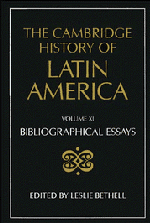Book contents
- Frontmatter
- I THE INDIGENOUS PEOPLES OF MIDDLE AND SOUTH AMERICA ON THE EVE OF THE CONQUEST
- II COLONIAL SPANISH AMERICA
- III COLONIAL BRAZIL
- IV THE INDEPENDENCE OF LATIN AMERICA
- V LATIN AMERICA: ECONOMY, SOCIETY, POLITICS, c. 1820 TO c. 1870
- VI LATIN AMERICA: ECONOMY, SOCIETY, POLITICS, c. 1870 to 1930
- VII LATIN AMERICA: ECONOMY, SOCIETY, POLITICS, 1930 to c. 1990
- 1 Population
- 2 The Latin American economies, 1929–1939
- 3 The Latin American economies, 1939–c. 1950
- 4 The Latin American economies, 1950–1990
- 5 Urban growth and urban social structure
- 6 Agrarian structures
- 7 State organization
- 8 Democracy
- 9 The Left
- 10 The military in politics
- 11 The urban working class and labour movements
- 12 Rural mobilizations
- 13 Women in twentieth-century Latin America
- 14 The Catholic church
- 15 The Protestant churches
- 16 Mexico, c. 1930–1946
- 17 Mexico since 1946
- 18 Central America
- 19 Guatemala
- 20 El Salvador
- 21 Honduras
- 22 Nicaragua
- 23 Costa Rica
- 24 Panama
- 25 The Panama Canal Zone, 1904–1979
- 26 Cuba, c. 1930–1959
- 27 Cuba since 1959
- 28 The Dominican Republic
- 29 Haiti
- 30 Puerto Rico
- 31 Argentina, 1930–1946
- 32 Argentina since 1946
- 33 Uruguay
- 34 Paraguay
- 35 Chile, c. 1930–c. 1960
- 36 Chile since c. 1960
- 37 Peru, 1930–c. 1960
- 38 Peru since c. 1960
- 39 Bolivia
- 40 Colombia
- 41 Ecuador
- 42 Venezuela
- 43 Brazil
- VIII IDEAS IN LATIN AMERICA SINCE INDEPENDENCE
- IX LATIN AMERICAN CULTURE SINCE INDEPENDENCE
- X THE INTERNATIONAL RELATIONS OF LATIN AMERICA SINCE INDEPENDENCE
- THE CAMBRIDGE HISTORY OF LATIN AMERICA
11 - The urban working class and labour movements
from VII - LATIN AMERICA: ECONOMY, SOCIETY, POLITICS, 1930 to c. 1990
Published online by Cambridge University Press: 28 March 2008
- Frontmatter
- I THE INDIGENOUS PEOPLES OF MIDDLE AND SOUTH AMERICA ON THE EVE OF THE CONQUEST
- II COLONIAL SPANISH AMERICA
- III COLONIAL BRAZIL
- IV THE INDEPENDENCE OF LATIN AMERICA
- V LATIN AMERICA: ECONOMY, SOCIETY, POLITICS, c. 1820 TO c. 1870
- VI LATIN AMERICA: ECONOMY, SOCIETY, POLITICS, c. 1870 to 1930
- VII LATIN AMERICA: ECONOMY, SOCIETY, POLITICS, 1930 to c. 1990
- 1 Population
- 2 The Latin American economies, 1929–1939
- 3 The Latin American economies, 1939–c. 1950
- 4 The Latin American economies, 1950–1990
- 5 Urban growth and urban social structure
- 6 Agrarian structures
- 7 State organization
- 8 Democracy
- 9 The Left
- 10 The military in politics
- 11 The urban working class and labour movements
- 12 Rural mobilizations
- 13 Women in twentieth-century Latin America
- 14 The Catholic church
- 15 The Protestant churches
- 16 Mexico, c. 1930–1946
- 17 Mexico since 1946
- 18 Central America
- 19 Guatemala
- 20 El Salvador
- 21 Honduras
- 22 Nicaragua
- 23 Costa Rica
- 24 Panama
- 25 The Panama Canal Zone, 1904–1979
- 26 Cuba, c. 1930–1959
- 27 Cuba since 1959
- 28 The Dominican Republic
- 29 Haiti
- 30 Puerto Rico
- 31 Argentina, 1930–1946
- 32 Argentina since 1946
- 33 Uruguay
- 34 Paraguay
- 35 Chile, c. 1930–c. 1960
- 36 Chile since c. 1960
- 37 Peru, 1930–c. 1960
- 38 Peru since c. 1960
- 39 Bolivia
- 40 Colombia
- 41 Ecuador
- 42 Venezuela
- 43 Brazil
- VIII IDEAS IN LATIN AMERICA SINCE INDEPENDENCE
- IX LATIN AMERICAN CULTURE SINCE INDEPENDENCE
- X THE INTERNATIONAL RELATIONS OF LATIN AMERICA SINCE INDEPENDENCE
- THE CAMBRIDGE HISTORY OF LATIN AMERICA
Summary
The literature on labour movements and the working class in Latin America in the period since 1930 is most abundant for Brazil and Mexico, followed by Argentina, Chile, Colombia and Peru. There is a limited literature on the remaining countries. Works dealing specifically with occupational structure, and with the political parties of the Left, have been omitted; they are covered in other bibliographic essays in this volume. Works dealing with labour law have also been omitted, unless these have a specific historical or substantive focus.
There are a number of general surveys of the field. Of these, perhaps the most interesting (though also highly debated) are R. B. Collier and D. Collier, Shaping the Political Arena (Princeton, N.J., 1991), and C. Bergquist, Labor in Latin America (Stanford, Calif, 1986). The former is a massive interpretative effort of the political incorporation of labour and its effects on political development in eight countries: Argentina, Chile, Brazil, Uruguay, Colombia, Venezuela, Peru and Mexico. The latter, employing an interpretative scheme drawn from dependency and labour process theories, compares Chile, Argentina, Venezuela and Colombia. An earlier work which is still a useful and reliable introduction is Hobart Spalding, Jr., Organized Labor in Latin America (New York, 1977). See also Moisés Poblete Troncoso and Ben Burnett, The Rise of the Latin American Labor Movement (New York, 1960); R. J. Alexander, Labor Relations in Argentina, Brazil and Chile (New York, 1962); Victor Alba, Politics and the Labor Movement in Latin America (Stanford, Calif., 1968); Carlos Rama, Historia del movimiento obrero y social latinoamericano contemporáneo (Barcelona, 1976); and Moisés Poblete Troncoso, El movimiento obrero latinoamericano (Mexico, D.F., 1976).
- Type
- Chapter
- Information
- The Cambridge History of Latin America , pp. 617 - 634Publisher: Cambridge University PressPrint publication year: 1995



